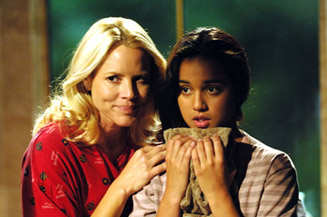Review: Towelhead
By Brandon Scott
July 30, 2008
The racial slur "towelhead" is supposed to imply a Middle Easterner, but that's one of the least offensive insults thrown around in this thought provoking drama. Originally titled the more mundane Nothing Is Private, this film might have been pitched as something like Crash meets American Beauty in a production meeting. Those two award-winning titles have similar themes within them as this one, respectively dealing with racial tension and identity as well as sexual exploration. Reverting back to the title Towelhead, the name of the novel that this film is adapted from, the title is sure to be a controversial and racy one (pun completely intended) to deal with.
Towelhead is centered around 13-year-old Jasira, played with verve by relative newbie Summer Bishil. Born of a mixed racial background, her white mother Gail (Mario Bello) sends her off to live with her Arab ex-husband, Rifat in a Houston suburb. There she deals with growing up in a new, racially-charged area where assumptions are made and slurs are slung in her direction without concern. Add that to the fact that Jasira is physically blossoming into a young woman wanting to begin exploring her sexuality, and you have the recipe for some incendiary situations.
Though our protagonist is a young girl, there are very real adult situations happening all around her. From looking at dirty magazines to hearing her Dad get it on with his new girlfriend, it appears Jasira can't seem to get away from sex and her curiosity is piqued. It's her budding sexual appetite that propels the film forward. When Jasira's neighbor Mr. Vouso (a creepy Aaron Eckhart) strangely befriends the young girl, another nosy neighbor Melina (veteran screen actress Toni Collette), believing that something inappropriate is intended, steps in to act as a mentor to her. While Jasira is growing up throughout the story, she is in many ways too naïve to understand what is taking place close to her.
One of the most complex characters in the film is Peter Macdissi's Rifat, who is struggling with his own identity trying to find his comfort zone in the world. Privately, he prays for the capture of Saddam Hussein (it's set in the Gulf War era), but won't debate the situation with his army reservist neighbor Vuoso, who stereotypes him as a Saddam apologist. Rifat is also a disciplinarian, showing little interest in giving any leeway to his child, yet he's rarely home to share his time with her, thereby giving her plenty of freedom anyway.
It's written and directed by Alan Ball, the Academy Award winning screenwriter of American Beauty. While it's Ball's first feature film (he does have directing experience in TV's Six Feet Under), he understands actors and allows them room to move. It's the acting performances are this film's strength. Eckhart continues to further the idea that he is one of the best actors around as he brings a likeable, innocent quality to the devious Vouso. He may have been two-faced in The Dark Knight but he has three full dimensions here. Also noteworthy was youngster Eugene Jones, who as Jasira's black boyfriend Thomas, captures the pseudo-innocence of young male sexual urges all to well. Thomas bonds with Jasira through being racial outcasts at school and they quickly begin their youthful exploration of sex.
This is a film about racism, stereotypes and the grasp to universally understand these difficult issues. The slurs used in the film are heavy and harsh but Ball also allows some of the situations to generate humor. Some of it genuinely funny and some of it awkward and gut-wrenching, yet still forcing you to laugh uncomfortably nonetheless. But I think that is kind of how we often treat race and racial issues. We laugh at things or people that are different from us or at that which we do not know.
You get the sense that this film has Oscar potential. If that does happen, odds are that it would be for Bishil's acting. I don't know that this will happen or if it is even worthy of it in my mind, but when an 18-year-old is playing 13 as convincingly as this and her character is dealing with very adult themes, sometimes the Academy comes a-callin'. 2003's Whale Rider saw Keisha Castle-Hughes get an acting nomination so it's not without precedent to see something similar take place here.
Unfortunately, the film is not without its share of problems. It tries to find the soul within the characters' ugliness and discomfort and it struggles to capture this at times. There are also a few scenes, scenarios, or even character traits that didn't feel genuine enough to me, even though it is based on autobiographical events. This version of the film has lost 20 minutes in length from the one that showed at Sundance in January and I wonder if that is a good or a bad thing in the end. Less is generally more, but here there are still some unanswered questions that plagued this viewer. The hard-hitting climax we are expecting to come feels like more of a slap on the wrist. Towelhead is interesting, well-acted, and I am sure it intended to send a strong message. I am just not entirely clear on what that message is. 2.5 out of 4 stars.
|
|
|
|




